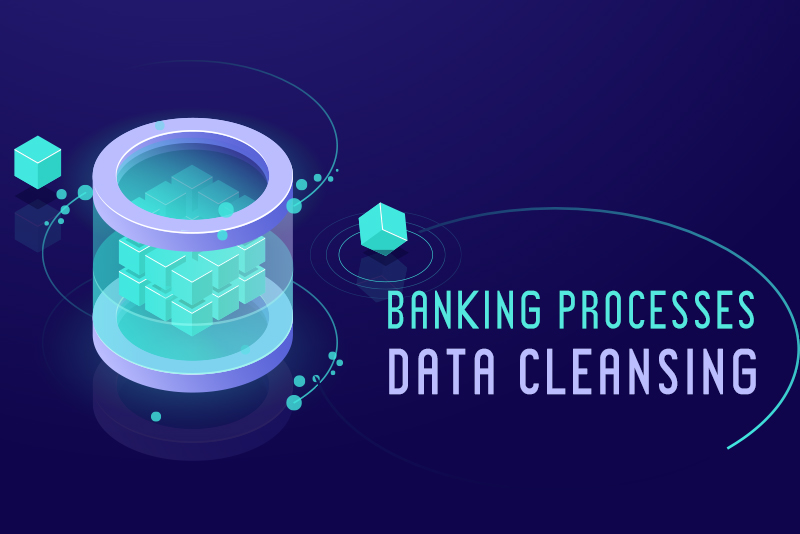Due to the sensitive nature of the industry, banks must ensure that their data is clean, sorted, and classified. Regulations in the financial industry are continually growing in number and scope. As a result, banks must devote a substantial percentage of their resources to ensure compliance with these criteria. Banks also need to stay competitive, efficiently meet the rising needs of their consumers, enhance their experience, and improve operational performance. Having clean, reliable data is crucial to meet these goals. Today, banks are investing in data cleansing services to ensure access to clean data. Data cleaning can help banks improve customer service, preserve their reputation, reduce regulatory concerns, and drive growth.
What is Data Cleansing and Why is it Important
Data cleansing, also known as data scrubbing, is the process of detecting fraud and removing errors and inconsistencies from data in order to improve data quality. Misspellings, improper data input, missing information, and other invalid entries can contribute to quality issues in data collections such as files and databases. When many data sources are merged, such as in data warehouses, federated database systems, or global information systems, data cleansing is extremely important. Consolidation of diverse data representations and deletion of redundant information are required to enable access to correct and consistent data. Data cleansing is essential for improving data quality and providing more consistent and reliable information to serve as a foundation for decision-making. Data becomes more actionable when it is uniform, allowing consumers and businesses to make better decisions.
Challenges of Managing Bank Data
- Volume: Banks deal with enormous amounts of data. This data is generated from a variety of sources, including customer transactions, ERP systems, CRM systems, and so on. This information must be accurate.
- Accessibility: Banks must ensure that authorized users have access to data. Data should be accessible to authorized users from anywhere in the world.
- Quality: Banks must ensure data quality. Efficient data cleansing support can ensure reliable, error-free data.
- Accuracy: Banks must ensure that data is accurate. Inaccurate data can lead to incorrect judgements, which can result in organizational failure and reputational damage.
- Security: Banks must ensure that their customers’ data is protected from illegal access, fraud and theft.
Five Tips for Banks to Improve their Data Management and Analytics Capabilities
- Set up a centralized database: The first step is to establish a central data repository to house all records. This will help keep data clean, organized, and accessible to authorized individuals. This will also enable tracking changes and monitoring access to sensitive information.
- Create a data governance structure: A data governance system must be implemented to ensure that data is correct and compliant. This will help develop rules and procedures for handling the data. It will also ensure that sensitive information is only accessible to authorized individuals.
- Set up quality control measures: Data quality control is vital for ensuring the accuracy and compliance of bank data. These controls can help detect and correct errors.
- Data cleansing: Several technologies are available to automate data cleansing. These tools can also help find and eliminate duplicate records from the database.
- Train staff: Staff must be trained on how to maintain and use data safely and effectively. They should be able to recognize and correct any errors, and also be aware of the significance of data confidentiality.
How Data Cleansing Improves Banking Processes
- Boosts Productivity: With data cleansing services, banks can enhance efficiency. Outsourcing reduces the amount of time and resources needed to manually cleanse data, which can boost efficiency. Furthermore, automated data cleaning can help to ensure that data is cleansed on a regular basis, keeping it correct and up to date.
- Improves Account Management: Improving the quality of customer data through data cleansing can help banks improve account management. They can better understand their consumers, and provide focused and personalized services. Data cleaning can also improve fraud detection and prevention, protecting both the bank and its clients from losses.
- Drives Consumer Acquisition: By checking and cleaning consumer data, banks can enhance customer acquisition. It ensures that the bank has accurate and up-to-date information about its customers, which can be used to more effectively target them. Furthermore, data cleansing can improve client segmentation and targeting, allowing banks to focus their marketing efforts and resources more effectively.
- Find New Markets: Banks might target new markets by cleansing their data. Banks can improve their customer base and income by discovering new markets and targeting them with individual marketing strategies. Data cleansing can help banks identify new markets through customer data analysis as well as:
- to find trends and patterns
- to new market segments
- to develop focused marketing campaigns
- Minimize Customer Attrition: Data cleansing can also help banks with lower client attrition by identifying consumers who are likely to leave and reach out to them with targeted marketing strategies.
If you are struggling with inaccuracies in data or poor data quality, our professional data cleansing services can provide the solution.
Managed Outsource Solutions uses advanced technologies to help businesses maintain their valuable data. Call our toll free number (800) 670-2809 today!
Data scrubbing allows banks to maintain accurate, complete, and consistent data that will help them make informed decisions and ensure that their operations are reliable and trustworthy. Outsourcing the task to a reliable data cleansing service provider can ensure customized solutions to ensure their information is accurate and complete.




